Julia Benally's Blog, page 18
June 15, 2018
Something Beautiful
Beautiful Dream has been released in HellBound-books' anthology, Graveyard Girls. I've been waiting for this since December! First of all, buy it here!

Beautiful Dream isn't like my other stories.
One night, I was sitting up. I knew I wanted to write something, but I couldn't think of anything to write. Finally I decided to just start writing and see. As I typed, the characters wove into being. About halfway, I began to get an idea of what was going on. Near the end, I was weirded out with myself.
Personally I didn't like it. I had no clue what I had written. I didn't know what to do with it. It was missing something and I couldn't think what. I had a crazy notion to send it out like that, but I didn't. I put it away.

Later that fall, my brother took a course on philosophy. He had no clue what he was looking at. When I tried to help, my head spun. I'm not into philosophy, but as I looked over the philosophy books, I realized, hey, I can use this bull crap for something, but I don't know what.
Several more months went by, and my friend Scarlett R. Algee told me about a magazine that wanted weird. I thought of Beautiful Dream, which at the time had a different title. I pulled it out of storage and stared at it. Suddenly, I knew what the philosophy was for, and what Beautiful Dream was missing.
I smashed them together and bam, I had one funky story. Two weeks after Beautiful Dream was finished and nicely edited, HellBound-books snatched it up. Indeed, this funky story I hated really turned out to be a beautiful dream.
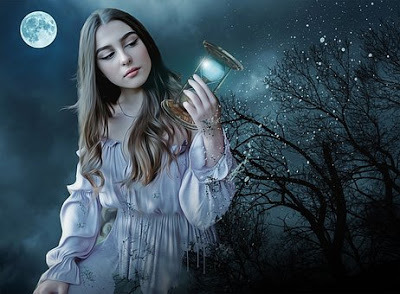

Beautiful Dream isn't like my other stories.
One night, I was sitting up. I knew I wanted to write something, but I couldn't think of anything to write. Finally I decided to just start writing and see. As I typed, the characters wove into being. About halfway, I began to get an idea of what was going on. Near the end, I was weirded out with myself.
Personally I didn't like it. I had no clue what I had written. I didn't know what to do with it. It was missing something and I couldn't think what. I had a crazy notion to send it out like that, but I didn't. I put it away.

Later that fall, my brother took a course on philosophy. He had no clue what he was looking at. When I tried to help, my head spun. I'm not into philosophy, but as I looked over the philosophy books, I realized, hey, I can use this bull crap for something, but I don't know what.
Several more months went by, and my friend Scarlett R. Algee told me about a magazine that wanted weird. I thought of Beautiful Dream, which at the time had a different title. I pulled it out of storage and stared at it. Suddenly, I knew what the philosophy was for, and what Beautiful Dream was missing.
I smashed them together and bam, I had one funky story. Two weeks after Beautiful Dream was finished and nicely edited, HellBound-books snatched it up. Indeed, this funky story I hated really turned out to be a beautiful dream.

Published on June 15, 2018 20:08
May 21, 2018
Scarlett's Tips: Thoughts On Writing Dialect
Today I have a guest, Scarlett R. Algee, a fantastic writer and editor coming to you with some seriously good tips on writing dialect. Let me cut to the chase so you can learn and enjoy!

Scarlett’s Tips: Thoughts on Writing Dialect
Oh, dialect. An excellent way to add color and dimension to your characters’ speech, but so very hard to write well, and so easy to write badly/offensively.
Let’s take a short look at what dialect is, what it isn’t, what some examples can look like, and what you can do to use it more effectively.
What Dialect Is, and Isn’t
Dialect is the set of grammatical and verbal distinctions that sets speakers of a language in one region apart from speakers of the same language in another region. It’s why your relatives in Maine may have a somewhat different vocabulary than your relatives in California. It’s why speakers of British English tend to say “got” as the past tense of “get,” rather than the “gotten” of American English. It’s why we have not-at-all heated discussions over the correct usage of “soft drink,” “soda,” and “pop.” Dialect is, at bottom, about regionalized vocabulary and grammar.
What dialect isn’t about: pronunciation. When you imagine, for example, someone from the American South pronouncing “all right” as something like “aight,” or “can’t” as “caint,” that’s not dialect; it’s accent. They’re related, but very much two separate things. Anyone can pronounce words in a way that catches the ear, while still adhering to the standard grammar rules of their language.

Examples of Dialect
I could give lots of examples of how dialect is written, but for the sake of brevity, here are two.
H. P. Lovecraft, “The Dunwich Horror”
“I dun’t keer what folks think—ef Lavinny’s boy looked like his pa, he wouldn’t look like nothin’ ye expeck.”
That’s just one sentence out of many, many Lovecraft examples I could give, and it’s one of the better ones. In standard English, it would read “I don’t care what folks think—if Lavinia’s boy looked like his father, he wouldn’t look like anything you expect”—and, in fact, none of the intended meaning would be lost. The phonetic renderings—“keer” and “expeck”—are unnecessarily awkward, but we’ll talk about that in a bit.
Harriet Beecher Stowe, Uncle Tom’s Cabin
“S’pose we must be resigned; but oh Lord! how ken I? If I know’d anything whar you’s goin’, or how they’d sarve you! Missis says she’ll try and ‘deem ye, in a year or two; but Lor! nobody never comes up that goes down thar! They kills ‘em! I’ve hearn ‘em tell how dey works ‘em up on dem ar plantations.”
I can’t claim to be any kind of expert on African-American Vernacular English (not that Stowe would’ve known that phrase), but my default setting is Southern, so I can render this in modern standard English thus:
“I suppose we must be resigned, but oh Lord! how can I? If I knew anything [of] where you’re going or how they’d treat you! Missus says she’ll try and redeem you, in a year or two, but Lord! nobody ever comes back that goes down there! They kill them! I’ve heard them tell how they work them on those plantations.”
Ugh.
I really, really tried to come up with an example of good dialect in fiction, but alas, Google failed me in providing any sort of consensus on “good.” (Opinions welcome; my source list below has various examples.)

Writing Dialect to Your Advantage
Notice that in both Lovecraft’s and Stowe’s examples, the dialogue serves to “other” the speakers—specifically, to set them apart as poor, rural, uneducated, and undesirable. This happens because a lot of writers think they’re writing “dialect” by writing character speech phonetically: they pepper their dialogue with things like fer, wuz, dis, dat, bettah, nevah, waddah. (Bonus points if you can sort all that out.)
Don’t do this. First of all, writing a character’s speech phonetically (see Stowe, above) is a good way to alienate readers by making your dialogue unreadable. Weird spellings that aren’t easy to interpret will make a lot of readers put the book down (or throw it across the room). Secondly, phonetic writing almost always is used to set one character or group apart from another character or group in an unflattering way. If all your white characters speak standard English, but all your non-white characters speak in clumps of bad spelling, your readers will make unpleasant assumptions about YOU.
So what can you do? Lots of things, but here are a few.
1. Research the dialect you want to write. Where it’s used, by whom, in what time period. Don’t focus on the sound; focus on the vocabulary. Remember, the important thing is what’s said, not how it’s pronounced.
2. Listen to real people. This is an extension of #1, but unless you plan to use a historical dialect that’s now defunct, paying attention to the speech patterns of folks on the subway or on the bus or in the Walmart checkout line will help you, and it’s free. (If you are using a defunct dialect, try YouTube and hope for the best.)
3. Study a foreign language. You don’t have to go for fluency; using an app like Duolingo will suffice. Trying to attain correctness in an unfamiliar language will make you pay attention to your own speech patterns, which is unbelievably useful.
4. Do not—do not—write phonetically. You’ll have readers who are disappointed and offended, and you’ll look like you don’t know what you’re doing.
There. I might oughta writ more, but this was a fair to middlin’ start. (See what I did there?) Now go forth and write awesomely, aight?
Scarlett R. Algee’s editing work includes The Cronian Incident and The Scalpel (both from Castrum Press); she’s also edited and contributed to the bestselling anthologies Explorations: War and Explorations: Colony (Woodbridge Press). Her fiction has been published by Body Parts Magazine, Pen of the Damned, and The Wicked Library, among other places, and her short story “Dark Music,” written for the podcast The Lift, was a 2016 Parsec Awards finalist. She lives in rural Tennessee with a beagle and an uncertain number of cats, skulks on Twitter at @scarlettralgee, and blogs occasionally at scarlettralgee.wordpress.com.
Sources and Further Reading
https://en.oxforddictionaries.com/exp...
http://www.justaboutwrite.com/A_Archi...
https://www.quickanddirtytips.com/edu...
https://literarydevices.net/dialect/
https://www.writingforward.com/news-a...

Scarlett’s Tips: Thoughts on Writing Dialect
Oh, dialect. An excellent way to add color and dimension to your characters’ speech, but so very hard to write well, and so easy to write badly/offensively.
Let’s take a short look at what dialect is, what it isn’t, what some examples can look like, and what you can do to use it more effectively.
What Dialect Is, and Isn’t
Dialect is the set of grammatical and verbal distinctions that sets speakers of a language in one region apart from speakers of the same language in another region. It’s why your relatives in Maine may have a somewhat different vocabulary than your relatives in California. It’s why speakers of British English tend to say “got” as the past tense of “get,” rather than the “gotten” of American English. It’s why we have not-at-all heated discussions over the correct usage of “soft drink,” “soda,” and “pop.” Dialect is, at bottom, about regionalized vocabulary and grammar.
What dialect isn’t about: pronunciation. When you imagine, for example, someone from the American South pronouncing “all right” as something like “aight,” or “can’t” as “caint,” that’s not dialect; it’s accent. They’re related, but very much two separate things. Anyone can pronounce words in a way that catches the ear, while still adhering to the standard grammar rules of their language.

Examples of Dialect
I could give lots of examples of how dialect is written, but for the sake of brevity, here are two.
H. P. Lovecraft, “The Dunwich Horror”
“I dun’t keer what folks think—ef Lavinny’s boy looked like his pa, he wouldn’t look like nothin’ ye expeck.”
That’s just one sentence out of many, many Lovecraft examples I could give, and it’s one of the better ones. In standard English, it would read “I don’t care what folks think—if Lavinia’s boy looked like his father, he wouldn’t look like anything you expect”—and, in fact, none of the intended meaning would be lost. The phonetic renderings—“keer” and “expeck”—are unnecessarily awkward, but we’ll talk about that in a bit.
Harriet Beecher Stowe, Uncle Tom’s Cabin
“S’pose we must be resigned; but oh Lord! how ken I? If I know’d anything whar you’s goin’, or how they’d sarve you! Missis says she’ll try and ‘deem ye, in a year or two; but Lor! nobody never comes up that goes down thar! They kills ‘em! I’ve hearn ‘em tell how dey works ‘em up on dem ar plantations.”
I can’t claim to be any kind of expert on African-American Vernacular English (not that Stowe would’ve known that phrase), but my default setting is Southern, so I can render this in modern standard English thus:
“I suppose we must be resigned, but oh Lord! how can I? If I knew anything [of] where you’re going or how they’d treat you! Missus says she’ll try and redeem you, in a year or two, but Lord! nobody ever comes back that goes down there! They kill them! I’ve heard them tell how they work them on those plantations.”
Ugh.
I really, really tried to come up with an example of good dialect in fiction, but alas, Google failed me in providing any sort of consensus on “good.” (Opinions welcome; my source list below has various examples.)

Writing Dialect to Your Advantage
Notice that in both Lovecraft’s and Stowe’s examples, the dialogue serves to “other” the speakers—specifically, to set them apart as poor, rural, uneducated, and undesirable. This happens because a lot of writers think they’re writing “dialect” by writing character speech phonetically: they pepper their dialogue with things like fer, wuz, dis, dat, bettah, nevah, waddah. (Bonus points if you can sort all that out.)
Don’t do this. First of all, writing a character’s speech phonetically (see Stowe, above) is a good way to alienate readers by making your dialogue unreadable. Weird spellings that aren’t easy to interpret will make a lot of readers put the book down (or throw it across the room). Secondly, phonetic writing almost always is used to set one character or group apart from another character or group in an unflattering way. If all your white characters speak standard English, but all your non-white characters speak in clumps of bad spelling, your readers will make unpleasant assumptions about YOU.
So what can you do? Lots of things, but here are a few.
1. Research the dialect you want to write. Where it’s used, by whom, in what time period. Don’t focus on the sound; focus on the vocabulary. Remember, the important thing is what’s said, not how it’s pronounced.
2. Listen to real people. This is an extension of #1, but unless you plan to use a historical dialect that’s now defunct, paying attention to the speech patterns of folks on the subway or on the bus or in the Walmart checkout line will help you, and it’s free. (If you are using a defunct dialect, try YouTube and hope for the best.)
3. Study a foreign language. You don’t have to go for fluency; using an app like Duolingo will suffice. Trying to attain correctness in an unfamiliar language will make you pay attention to your own speech patterns, which is unbelievably useful.
4. Do not—do not—write phonetically. You’ll have readers who are disappointed and offended, and you’ll look like you don’t know what you’re doing.
There. I might oughta writ more, but this was a fair to middlin’ start. (See what I did there?) Now go forth and write awesomely, aight?
Scarlett R. Algee’s editing work includes The Cronian Incident and The Scalpel (both from Castrum Press); she’s also edited and contributed to the bestselling anthologies Explorations: War and Explorations: Colony (Woodbridge Press). Her fiction has been published by Body Parts Magazine, Pen of the Damned, and The Wicked Library, among other places, and her short story “Dark Music,” written for the podcast The Lift, was a 2016 Parsec Awards finalist. She lives in rural Tennessee with a beagle and an uncertain number of cats, skulks on Twitter at @scarlettralgee, and blogs occasionally at scarlettralgee.wordpress.com.
Sources and Further Reading
https://en.oxforddictionaries.com/exp...
http://www.justaboutwrite.com/A_Archi...
https://www.quickanddirtytips.com/edu...
https://literarydevices.net/dialect/
https://www.writingforward.com/news-a...
Published on May 21, 2018 00:37
May 17, 2018
Writer's Life: Dealing With Annoying People
They say a writer's life is challenging and frustrating, but seriously, for a real writer, writing is an escape. For a writer, escaping to another world isn't limited to books written by other people. A writer can escape any time and go anywhere.

Rejection letters always suck, brains get hurt, and we go dark for weeks at a time and don't see people. That's okay, though. Most writers can't stand people for too long. In fact, it's the people AROUND us that makes life frustrating.

1.
Loser: "What do you do?"
Writer: "I write."
Loser: "Don't you have a real job?"
Writer: "I thought you were a real person. Never mind."
Seriously, what IS that supposed to mean?
2.
Loser: "You're a writer?"
Writer: "Yeah!"
Loser: "How much do you get paid?"
Writer: "I get paid in knuckle sandwiches. Do you want one, nosy?"
What kind of an impertinent question is that? Have they no manners?
3.
Loser: "What do you write?"
Writer: "Well, I write..."
Loser: "Oh, I don't like that genre."
Writer: "Punk."
If you're a horror writer, you do all you can to scare him/her. Heh-heh-heh...and then you watch the reaction and take note.
4.
Loser: "Have you gotten anything published?"
Writer: "Yes, lots! Do you want to read some?"
Loser: "Oh, I only read good things."
Writer: "What's that supposed to mean? You've never read any of my stuff." Hopefully you can get something sharp and scratch IDIOT on the back of his/her car.
5.
Loser: "So you're a published author. I guess that's great, but I don't read."
Writer: "That's okay. I have a story in a podcast. You can listen to it, and won't have to read at all."
Loser runs away and later does a back flip off a stage for absolutely no reason and almost kills himself. No wonder.
6.
Loser: "I hear you write fantasy."
Writer: "Some."
Loser: "Harry Potter?"
Writer: "That's already been written, dummy."
Why IS that first thing out of people's mouths?
7.
Loser: "You write horror?"
Writer: "Yeah."
Loser: "Like Twilight?"
Writer: "That's not horror, and I hate Twilight. I've been insulted!"
Blade still needs to chop off Edward's cheesy head.
8.
Loser in interrogating tone: "Have you been published yet?"
Writer: "Not yet."
Loser: An evil little smile.
Later...
Loser: "Have you been published yet?"
Writer: "Yes!"
Loser: The most disappointed frown you've ever seen, and then she slinks away into the slime pit she crawled out of. There she waits for you to turn her into a monster in one of your stories, and where she dies a terrible death.
They can all go back to the slime pit, because I think all losers come from there. Writers, dip your ladles in and pick a loser to destroy in a story. The pit will never run short of them, you know.
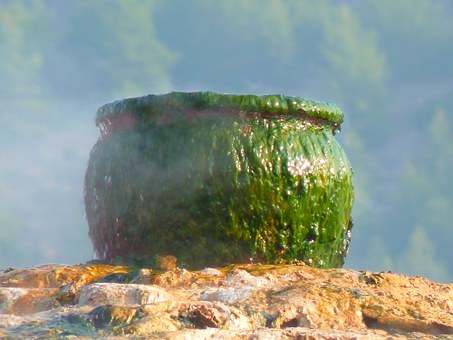

Rejection letters always suck, brains get hurt, and we go dark for weeks at a time and don't see people. That's okay, though. Most writers can't stand people for too long. In fact, it's the people AROUND us that makes life frustrating.

1.
Loser: "What do you do?"
Writer: "I write."
Loser: "Don't you have a real job?"
Writer: "I thought you were a real person. Never mind."
Seriously, what IS that supposed to mean?
2.
Loser: "You're a writer?"
Writer: "Yeah!"
Loser: "How much do you get paid?"
Writer: "I get paid in knuckle sandwiches. Do you want one, nosy?"
What kind of an impertinent question is that? Have they no manners?
3.
Loser: "What do you write?"
Writer: "Well, I write..."
Loser: "Oh, I don't like that genre."
Writer: "Punk."
If you're a horror writer, you do all you can to scare him/her. Heh-heh-heh...and then you watch the reaction and take note.
4.
Loser: "Have you gotten anything published?"
Writer: "Yes, lots! Do you want to read some?"
Loser: "Oh, I only read good things."
Writer: "What's that supposed to mean? You've never read any of my stuff." Hopefully you can get something sharp and scratch IDIOT on the back of his/her car.
5.
Loser: "So you're a published author. I guess that's great, but I don't read."
Writer: "That's okay. I have a story in a podcast. You can listen to it, and won't have to read at all."
Loser runs away and later does a back flip off a stage for absolutely no reason and almost kills himself. No wonder.
6.
Loser: "I hear you write fantasy."
Writer: "Some."
Loser: "Harry Potter?"
Writer: "That's already been written, dummy."
Why IS that first thing out of people's mouths?
7.
Loser: "You write horror?"
Writer: "Yeah."
Loser: "Like Twilight?"
Writer: "That's not horror, and I hate Twilight. I've been insulted!"
Blade still needs to chop off Edward's cheesy head.
8.
Loser in interrogating tone: "Have you been published yet?"
Writer: "Not yet."
Loser: An evil little smile.
Later...
Loser: "Have you been published yet?"
Writer: "Yes!"
Loser: The most disappointed frown you've ever seen, and then she slinks away into the slime pit she crawled out of. There she waits for you to turn her into a monster in one of your stories, and where she dies a terrible death.
They can all go back to the slime pit, because I think all losers come from there. Writers, dip your ladles in and pick a loser to destroy in a story. The pit will never run short of them, you know.

Published on May 17, 2018 01:52
April 14, 2018
Pop Quiz? Pop Interview!

I was scrolling through twitter and I was suddenly answering interview questions by Tina Silvens, the author of "The Mysterious Soldier." It's a fantastic fantasy book which I read in a day and thoroughly enjoyed.
Click on over right here to check out Tina Silven's books!
Come read my interview here. It's a pop interview, because it was sudden and struck like lightning! Only it was more enjoyable because it was a writing interview and not that abominable thing called MATH, or ECONOMY. Happiest D+ I ever had.
Published on April 14, 2018 23:38
March 26, 2018
Opening Robert's Doors
"Robert" was my first story inspired by a poem. The poem is called "Mariana" by Alfred Lord Tennyson. I read it because I wanted to know what poem Professor Higgins was making Eliza recite when she had all the marbles in her mouth.

I thought the poem was gorgeous, but what was it saying? I interpreted it as some girl pining after her lover and being freakin' annoying about it.

Some people think the main character isn't very likable, but I never meant her to be. I enjoyed watching her descent into madness.

You can read "Mariana" here.

I thought the poem was gorgeous, but what was it saying? I interpreted it as some girl pining after her lover and being freakin' annoying about it.

Some people think the main character isn't very likable, but I never meant her to be. I enjoyed watching her descent into madness.

You can read "Mariana" here.
Published on March 26, 2018 12:15
March 19, 2018
Memorial of the Fishies
This past weekend, Piggy died. His funeral services were held in the bathroom, March 17, 2018, where he was flushed away.
 pic by Aaron Huber
pic by Aaron Huber
Poor Piggy. He was an eating machine who sometimes preferred to slide on his belly while he ate. In true Piggy fashion, he was found with his face smashed into a pile of food at the bottom of the tank.
Not many people knew Piggy's real name. It was Malerick, named after the killer magician in Jeffery Deaver's book "The Vanished Man." Piggy was no killer, though. He was pink and he loved to eat, hence his name Piggy.
Piggy's cause of death was not the "ick" which had plagued him, for he was finally cured of that. It was the chlorine in the water. The Tribe has been dumping chlorine into the already clean water, more than is necessary, and more often than necessary. No amount of drops in the tank could remove the chlorine. They poisoned Piggy.
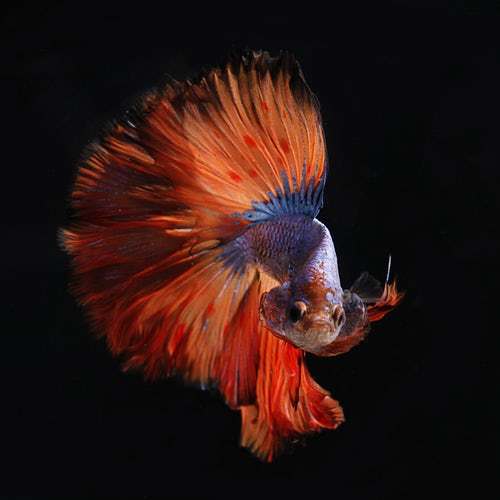 pic by Pietro Jeng
pic by Pietro Jeng
In our mourning for Piggy, let's not forget the other fish who met a similar fate, in other times. Before Piggy, there was Dr. Caspian Oatmeal Lecter. A black king fighting fish that couldn't tell the difference between reality and a reflection. He constantly rammed his head against his reflection and made faces at it so scary that he would run in fear from himself. Several times he knocked himself out. One night, he was found behind the Tiki he called home, dead. Some believe he died of the "ick." Others think he finally knocked his own brains out. But others believe that he finally scared himself to death.
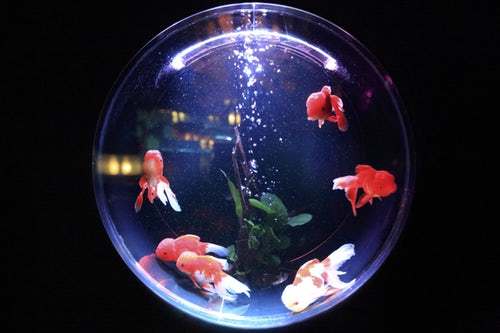 pic by kazuend
pic by kazuend
There was Jaw Breaker. He was a giant white fish, living in a massive tank with his neighbors, until one of the neighbors ate him in cold blood. I didn't know Jaw Breaker very well. He only lived for a week.
Before Jaw Breaker was a fish I didn't even get a chance to name before death took him.
And then there was Kato. He was just a plain goldfish, wise in all his undertakings, and as hardy as they come. He became so old that he turned white. And then on my ninth birthday, he was brutally murdered by a punk who poured canola oil into his tank, and then fled the scene of the crime. Little did the wretch know that there was a witness.
Piggy has joined these other fish in the sky. We shall remember Piggy, my little fat slob.
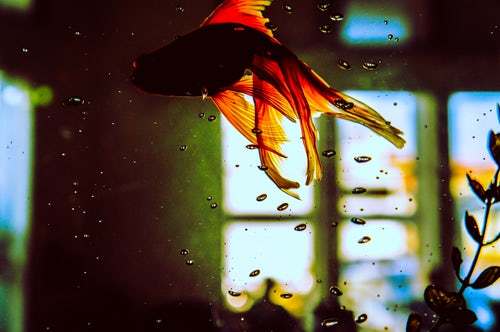 pic by Danilo Batista
pic by Danilo Batista
 pic by Aaron Huber
pic by Aaron HuberPoor Piggy. He was an eating machine who sometimes preferred to slide on his belly while he ate. In true Piggy fashion, he was found with his face smashed into a pile of food at the bottom of the tank.
Not many people knew Piggy's real name. It was Malerick, named after the killer magician in Jeffery Deaver's book "The Vanished Man." Piggy was no killer, though. He was pink and he loved to eat, hence his name Piggy.
Piggy's cause of death was not the "ick" which had plagued him, for he was finally cured of that. It was the chlorine in the water. The Tribe has been dumping chlorine into the already clean water, more than is necessary, and more often than necessary. No amount of drops in the tank could remove the chlorine. They poisoned Piggy.
 pic by Pietro Jeng
pic by Pietro JengIn our mourning for Piggy, let's not forget the other fish who met a similar fate, in other times. Before Piggy, there was Dr. Caspian Oatmeal Lecter. A black king fighting fish that couldn't tell the difference between reality and a reflection. He constantly rammed his head against his reflection and made faces at it so scary that he would run in fear from himself. Several times he knocked himself out. One night, he was found behind the Tiki he called home, dead. Some believe he died of the "ick." Others think he finally knocked his own brains out. But others believe that he finally scared himself to death.
 pic by kazuend
pic by kazuendThere was Jaw Breaker. He was a giant white fish, living in a massive tank with his neighbors, until one of the neighbors ate him in cold blood. I didn't know Jaw Breaker very well. He only lived for a week.
Before Jaw Breaker was a fish I didn't even get a chance to name before death took him.
And then there was Kato. He was just a plain goldfish, wise in all his undertakings, and as hardy as they come. He became so old that he turned white. And then on my ninth birthday, he was brutally murdered by a punk who poured canola oil into his tank, and then fled the scene of the crime. Little did the wretch know that there was a witness.
Piggy has joined these other fish in the sky. We shall remember Piggy, my little fat slob.
 pic by Danilo Batista
pic by Danilo Batista
Published on March 19, 2018 14:56
March 12, 2018
Creating Female Characters
Female characters, especially in movies, have been butchered. Do you want to make a good female character? It's a delicate operation.

Remember five things.
1) She's not a sex object. The moment a female character gets naked, or her privates are described, she's a sex object. Sensual hints turns her into a plaything for sickos to fantasize about. If you don't describe a man's privates, then you certainly don't describe a woman's.

2) She's not a man. Making her act like one actually makes her annoying. You can't turn red into green. If you try, you end up with something muddy. Women are physically weaker than men. If there is a physically strong woman, there is always a man somewhere who will be stronger. It's a fact of life.
Example 1: Vasquez from "Aliens." Vasquez is badness unleashed without having to say so. You don't have that stupid conversation of "You need protection," and "I don't need protection." In case you didn't catch it, her lover is that giant blonde guy, and he has all confidence in her.
Example 2: Miss Perkins from "John Wick." The perfect jerk. I laughed when she got shot. She gave no quarter, and in return received none, and she accepted it. There was no "you wouldn't hit a lady, would you?" She wasn't a crybaby, she didn't ask for standards to be lowered or raised for her.
Example 3: Dolly Levi from "Hello Dolly!" Talk about the most conniving character ever. Scheming in woman's fashion, she'd outwit Lara Croft, Rey, and Carina Smyth any day without breaking a nail.
Example 4: Leia Organa from the original Star Wars trilogy. The perfect balance between power and femininity.
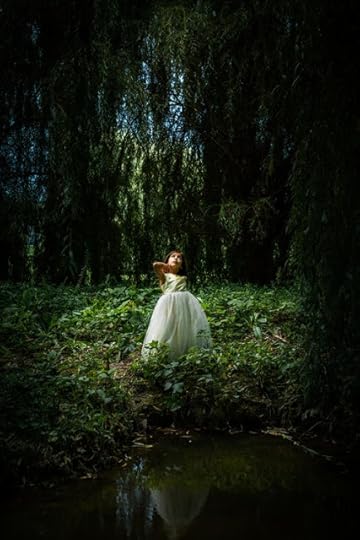
3) A woman is not a statement for people to use like a billboard. I've read books and watched movies and video games about women who are supposedly strong. For some reason that means they're hitting people and getting away with it. They're bossy, and people cower. That's called plot armor and bullying on a whole new level. A woman jumping into a fray with nothing but a stick against a bunch of guns, and then wins, makes you as a writer look like a complete idiot.
Bad Example 1: Beverly from the "It" remake. That girl was not real. Somehow she doesn't fear It, somehow she doesn't get hurt when she gets her hand cut, and she was turned into what I call a "wise mother."
Bad Example 2: Lightning from Final Fantasy 13. How do those twig arms smack the giant Snow to the ground? Why does she get to slap everybody and nobody retaliates? Yeah right. We would all break her stupid face.
Bad Example 3: Disney's live action Cinderella. A farmer girl who obviously kills animals to feed her evil stepmother is shrieking against the prince about hunting. What did that animal do to him? Nothing more than what the animals she killed did to her. Or does she not kill at all? What are all those animals on the farm for? Artistic portraits? If anything, she's the cruelest because she's their friend. Disney obviously used her to scream against hunting

4) She's an emotional creature. That means she's not stoic, no matter what her facade is. A woman's brain is one mass, so her emotions are in everything that she does. If you want a heroine, remember her emotions. If you want a villain, remember the emotions. You have to remember that she can also control them, unless she has her period and hasn't taken her happy pills. Play with the emotions based on what you want.
Example: Ella from "The Glass Slipper." She's probably the most realistic Cinderella ever made. She's dramatic, angry, and a spitfire with issues. She doesn't have some high ideal of being "always kind." She wasn't raised that way. At five her mother died and she's been mistreated ever since.

5) She's human. She's prone to stupidity, she has weaknesses, sometimes she can't think clearly. She can make bad decisions and suffer for them. Not everyone she knows will like her. Sometimes she insults people on accident. She doesn't have a perfect body like the magazine models. Not every woman puts on make-up, or even knows how.
Example 1: Miss Hannigan from the original "Annie." She had personality, no class, and made me chuckle from beginning to end.
Example 2: Joanna Stayton from "Overboard." This character went through a serious learning process. She had her strengths and weaknesses, but was hilarious throughout.
Example 3: Evelyn from the first "The Mummy." Evelyn's the funniest character in the movie. When movie makers took that away, the other movies ended up being lackluster at best. She had her own fire and nobody had to make way for her to shine.
With that said, a sign that you've made a bad female character is if you have to take the fire from another character in order to make her shine.
Good Example: Willie from "Indiana Jones and the Temple of Doom." Willie took airhead to the next level and bounced off of Indiana with perfection.
Bad Example: Talia from The Dark Knight Rises. They had to turn Batman into a crying wimp and Bane into her puppy dog to make her look good.
Some editors want writers to follow the rules for vampires, werewolves and zombies. It's the same if you're going to make a female character. Follow her rules and you won't end up with a bootleg version of a woman.


Remember five things.
1) She's not a sex object. The moment a female character gets naked, or her privates are described, she's a sex object. Sensual hints turns her into a plaything for sickos to fantasize about. If you don't describe a man's privates, then you certainly don't describe a woman's.

2) She's not a man. Making her act like one actually makes her annoying. You can't turn red into green. If you try, you end up with something muddy. Women are physically weaker than men. If there is a physically strong woman, there is always a man somewhere who will be stronger. It's a fact of life.
Example 1: Vasquez from "Aliens." Vasquez is badness unleashed without having to say so. You don't have that stupid conversation of "You need protection," and "I don't need protection." In case you didn't catch it, her lover is that giant blonde guy, and he has all confidence in her.
Example 2: Miss Perkins from "John Wick." The perfect jerk. I laughed when she got shot. She gave no quarter, and in return received none, and she accepted it. There was no "you wouldn't hit a lady, would you?" She wasn't a crybaby, she didn't ask for standards to be lowered or raised for her.
Example 3: Dolly Levi from "Hello Dolly!" Talk about the most conniving character ever. Scheming in woman's fashion, she'd outwit Lara Croft, Rey, and Carina Smyth any day without breaking a nail.
Example 4: Leia Organa from the original Star Wars trilogy. The perfect balance between power and femininity.

3) A woman is not a statement for people to use like a billboard. I've read books and watched movies and video games about women who are supposedly strong. For some reason that means they're hitting people and getting away with it. They're bossy, and people cower. That's called plot armor and bullying on a whole new level. A woman jumping into a fray with nothing but a stick against a bunch of guns, and then wins, makes you as a writer look like a complete idiot.
Bad Example 1: Beverly from the "It" remake. That girl was not real. Somehow she doesn't fear It, somehow she doesn't get hurt when she gets her hand cut, and she was turned into what I call a "wise mother."
Bad Example 2: Lightning from Final Fantasy 13. How do those twig arms smack the giant Snow to the ground? Why does she get to slap everybody and nobody retaliates? Yeah right. We would all break her stupid face.
Bad Example 3: Disney's live action Cinderella. A farmer girl who obviously kills animals to feed her evil stepmother is shrieking against the prince about hunting. What did that animal do to him? Nothing more than what the animals she killed did to her. Or does she not kill at all? What are all those animals on the farm for? Artistic portraits? If anything, she's the cruelest because she's their friend. Disney obviously used her to scream against hunting

4) She's an emotional creature. That means she's not stoic, no matter what her facade is. A woman's brain is one mass, so her emotions are in everything that she does. If you want a heroine, remember her emotions. If you want a villain, remember the emotions. You have to remember that she can also control them, unless she has her period and hasn't taken her happy pills. Play with the emotions based on what you want.
Example: Ella from "The Glass Slipper." She's probably the most realistic Cinderella ever made. She's dramatic, angry, and a spitfire with issues. She doesn't have some high ideal of being "always kind." She wasn't raised that way. At five her mother died and she's been mistreated ever since.

5) She's human. She's prone to stupidity, she has weaknesses, sometimes she can't think clearly. She can make bad decisions and suffer for them. Not everyone she knows will like her. Sometimes she insults people on accident. She doesn't have a perfect body like the magazine models. Not every woman puts on make-up, or even knows how.
Example 1: Miss Hannigan from the original "Annie." She had personality, no class, and made me chuckle from beginning to end.
Example 2: Joanna Stayton from "Overboard." This character went through a serious learning process. She had her strengths and weaknesses, but was hilarious throughout.
Example 3: Evelyn from the first "The Mummy." Evelyn's the funniest character in the movie. When movie makers took that away, the other movies ended up being lackluster at best. She had her own fire and nobody had to make way for her to shine.
With that said, a sign that you've made a bad female character is if you have to take the fire from another character in order to make her shine.
Good Example: Willie from "Indiana Jones and the Temple of Doom." Willie took airhead to the next level and bounced off of Indiana with perfection.
Bad Example: Talia from The Dark Knight Rises. They had to turn Batman into a crying wimp and Bane into her puppy dog to make her look good.
Some editors want writers to follow the rules for vampires, werewolves and zombies. It's the same if you're going to make a female character. Follow her rules and you won't end up with a bootleg version of a woman.

Published on March 12, 2018 13:01
February 21, 2018
Carrina Triumphant
Today I have decided to share a story with you that is now out of print. It was first published in Snapping Twig Magazine, which is now dead. Since this story has the infamous mark of "previously published" stamped on it, I figured why not put it here for your viewing? What's it gonna hurt, right?

Carrina Triumphantby Julia Benally
The clock’s red light glowed 7:59 A.M., but the Arizona heat was already creeping into the semi-darkness of the room. A thin ray of blinding gold pierced through a crack in the cream-colored blinds and shined on Carrina’s eye. With an irritated frown, the six-year-old rolled over. The stream of sun followed, as if it had glitched like a video game. She covered her head to keep it away, but the blanket heated up like an oven.Groaning, the girl threw the blanket off and sat up. Bushy raven hair popped out in all directions and poked her coal black eyes. Everything seemed as brown as the desert she lived in: the carpet, her bed, the bookshelf—even the white walls had a brownish hue. Going to the brown drawers, she pulled out a sparkly pink shirt and pink checkered skirt. Slipping them on, she tackled her wild locks. It didn’t go too well.Sometime around 8:15, her mother blew in the door, a whirlwind of perfume and hairspray. “Carrina, what are you wearing?” She set lacquered nails on jutting hips. “Where's your uniform?”Carrina sank into her bed. “I don't want it.” She frowned until the edges of her lips almost touched the bottom of her jaw. “It's ugly.”The woman rolled her shadowy eyes. “Put your uniform on.” She snatched it out of the closet and tossed it on the bed. “Don't give me a bad time, or I'll spank you.” She bustled out.Lower lip trembling in disgust and fear of a spank, Carrina removed her pretty clothes and struggled into the straitjacket—er, uniform. Now she was just as thirsty-looking as her room. She poked around for her shoes. It wasn't like she was in any rush. If she could be late all month, she could certainly be late today.“Carrina,” her mother shouted from the kitchen, “hurry up!”“I can't find my shoes,” Carrina said.“You just can't find your shoes because you're afraid of that girl at school.” The woman returned with even more perfume and make-up. She yanked Carrina's white shoes out from under the bed. “Learn to stand up to her.”Carrina twisted the bottom of her shirt into a ball around her fist. “Can I stay home today?”“No. I have to go to the store and all you'll do is beg for things.” She said it as if that were the only reason Carrina couldn’t stay home. “Sit down. Remember you're making a book today?”Carrina hopped onto her bed as her mom knelt to put her shoes on for her. “Will it have a leather cover and that gold stuff on the sides?”The woman shoved one shoe on, making Carrina’s knee jerk to her chest. “Don't expect too much. You're only six.” She grabbed Carrina’s other foot and pushed the other shoe on. The wily woman took her hand and rushed out the door. “You’re going to be so late. Why do you wake up so late? Set your alarm! I haven't even got my earrings on.” With that, the over-dressed woman swung Carrina into the front seat of the white ford. She hit the gas with her leopard high heels and zoomed towards Carrina's school.“You have to fight back,” said her mother for the umpteenth time.“I'll get in trouble,” Carrina mumbled. It was no use talking to her mom. The woman was a fiery spark that shot all over the place without catching a breath. She’d run people over if not for the law. Sometimes she forgot that Carrina existed, or so Carrina thought.Screeching to a halt in front of the school, Carrina's mother leaned over, pushed the door open, and pecked Carrina on the cheek. She shoved her onto the sidewalk. Before Carrina knew it, the white ford had sped away.Carrina stared at the big buildings and empty schoolyard. The swings still rocked from recess in the dead air. The windows in the classrooms were lit, each a world of its own, tucked safely away from the deadness outside. Carrina meandered onto the quiet campus. Hopefully a dog might decide to eat her, but there were no dogs today.She was a sad, tardy little girl when she opened the heavy metal door of the classroom and walked in. She halted and stared at the class. Something wasn’t right. The posters on the walls looked different, and the kids were all wrong. Goodness, even the teacher was in the wrong room. Did everybody get lost?The strange teacher smirked at her. “What is it?”Carrina stared. Everybody stared back.“Are you new?” The teacher sounded rather sarcastic.“Where's Mrs. Grant?” said Carrina. This had to be a substitute, and the kids, too. They were substitute kids. Or she was in some alternate universe.“Mrs. Grant's in room twenty-four.” The teacher’s grin grew wider. “This is room fourteen.”Carrina’s eyes widened. Heat ran up her neck, across her face and down to the tips of her wild curls. Thirty or so strange eyes bore into her as she backed out, pushed the door open and slid like a snake outside. Would her mom be upset if she walked home right now and buried herself in the backyard? But a dog might eat her before she reached the house.Another hallway down and she entered the correct room.“You see?” Mrs. Grant said. “I told you she’d be here.” The students roared with laughter.Carrina’s eye twitched. “What?” She sat down at her desk. Of course it had to be in the middle of the room so everyone could laugh and point. No uniform could hide their horrid expressions or suppress the fact that half of them were bullies. It just tricked everyone into thinking that they were good little children.Jimmy, who sat next to her, said, “Mrs. Grant said that you’d be late so she marked you here anyway.”Carrina beamed. She had totally lucked out! Plus, she was in the right room. Everything was good. No one need know of the escapade in the other hall.“When are we making the books?” Carrina said.“After lunch.” His blonde hair bobbed around his head.Carrina’s eyes sparkled. She had seen so many big books with great leather covers and golden words. She had held many as big as her, smelled their musty pages and read the beautiful words written across them. Of course she didn't know half of what she was reading, but it didn't matter. She was going to make a complicated book that no one could understand! What marvels would she write between those pages! People would find it centuries from now, in an old castle, and…Mrs. Grant tapped her shoulder. “Carrina…Carrina!”Carrina jumped. The woman seemed to tower to the ceiling. Her dark blue dress with the tiny red flowers encompassed the whole of Carrina's view. Goodness, Mrs. Grant's grimacing teeth were extra yellow today.“Why didn’t you answer me?” Mrs. Grant drummed the desk with a bent ruler. “And why aren't you doing your math?”“M-my math?” Carrina stared at the math paper with its incoherent black numbers. Where did that come from? “I thought math was at ten.” She could just see her boisterous mother in her mind's eye with a spank in her hard hand. The spank looked kind of green and globby with yellow eyes. But spanks shouldn't be green and globby, because they hurt, so a spank should have really looked like a...“Carrina!” Mrs. Grant smacked the desk with the ruler. “It is ten, it’s past ten!” Snickers chortled though the room. Mrs. Grant glared and they shut up. Little Jimmy almost slammed his face into his math paper and scribbled: 1+5= appols. Carrina always knew he was a bad speller.Mrs. Grant snatched up the empty math paper. “Come to the front of the class.” She slapped the paper on a lone desk and stood beside it.Carrina's face reddened. The desk was right in front of Crystal whose spoiled gray eyes gazed at her like a wolf ready to pounce. She sneered at Carrina and stuck her tongue out. For some reason, Mrs. Grant didn't catch that. She never caught anything important. It had to be because of that hideous dress.Gripping the edge of her desk, Carrina pushed herself up. Her chair grated across the hard gray carpet. Sneering, laughing eyes glanced her way as she made the green mile to the lonesome desk. She sat down in front of the rabid wolf. The chewed pencil in that grubby slender hand didn’t scrape the math paper like the other pencils. The wolf was watching.As soon as Mrs. Grant turned her back, Crystal poked Carrina with the pencil. Carrina bit her lip and stared at the math paper. The pencil tip gouged into her shoulder and then her arm. It slid across her back. Crystal giggled and Carrina knew that the wolf had drawn on her shirt. Paper crinkled. Ppft sounded from those thin pale lips and something landed in Carrina’s hair. The girl’s mouth tightened, but Crystal might beat her up if she did anything.Suddenly, Crystal started pulling the paper out of Carrina's bushy locks.“That's very nice of you, Crystal,” Mrs. Grant said kindly, and then her voiced sharpened. “How are you doing, Carrina?” She scrutinized Carrina's paper with beady eyes. She almost seemed disappointed as she straightened up. “Everyone, line up for lunch. Carrina, you line up last.”“I'll wait with her,” Crystal said as Carrina glanced fearfully at her.Mrs. Grant smiled. “You're a good girl, Crystal.” She left them there to oversee the other students.Crystal eyed Carrina with her little weasel face. “How come you don't fix your hair? You look ugly. Are you stupid? Don't you know how to brush your hair?”Carrina twisted the end of her shirt into a ball. “I do brush it.”“You're lying.” Crystal pointed at Carrina’s face and almost poked her eye. “Mrs. Grant, Carrina's a liar!”Mrs. Grant ignored the outburst. “Line up, girls.” Children would be children!Carrina lined up first, but Crystal knocked her back with her butt and cut in front of her. “You have to be last.” Her nose pinched up.Carrina sucked the sudden tears back in. If she cried, Crystal would laugh. Everyone would make fun of her, except Jimmy. Why couldn't she stand by Jimmy? He glanced back at her with his light blue eyes, and then at Crystal who grimaced at him. He quickly looked away. Crystal would love an excuse to pound his tiny frame. Last time, Crystal had said he had on lipstick before shoving dirt into his mouth.They marched to the cafeteria, but as was Mrs. Grant's custom, she stopped at the restrooms first. Carrina’s tiny bladder squealed for relief, but how embarrassing to be the only one who needed to pee! And she was starving! The restrooms would only slow them down. She was at the end of the line and might get stuck with the fish sandwich.Mrs. Grant scanned the students. “Does anyone need to go?”Carrina looked around. If someone else went, she would, too. But no one had to. How inconsiderate these people were! Didn't they know she had to pee? Crystal might follow her into the bathroom. What was she going to do?Amidst her panicked thoughts, Mrs. Grant said, “All right, let's go.” She walked off and the students followed. Carrina was going to die, she knew it. She couldn't hold it. But she couldn't tell Mrs. Grant that she needed to pee, not when Mrs. Grant had already given her the chance. Mrs. Grant might scold her. She already had it in for her.In the midst of this awful panic, Carrina couldn't hold it. Her pants grew wet and warm as a horrific puddle formed beneath her feet, filling her white shoes. Carrina's heart stopped. Maybe an alien would fly over and kidnap her. But no alien came. They didn't want to pick up a wet girl. Maybe someone else would get blamed for it. If enough people walked over the wet, someone would get blamed. That's what happened to Taylor last time. But last time wasn't this time. That stupid Crystal, who didn't have the decency to get run over, suddenly shouted, “Ew! Carrina peed on herself!”“YUCK!” The students formed a semicircle around her. Now she stood alone in a puddle of pee, the centerpiece of humiliation. Carrina couldn't move or think. Her social life was officially canceled. Nothing would ever be the same again. She would have to move away to escape her disgrace.Mrs. Grant stared at the ceiling. “Carrina!” This kid was driving her insane! “Go to the nurse.”Carrina tried to appear calm and collected as she walked away, but Crystal's voice rang out over the lines of students heading to lunch. “Carrina peed on herself!”The masses turned and looked. They pointed, they laughed, they cried out in disgust, they called her names, but no teacher lifted a finger to silence them. Tears dribbled down Carrina’s cheeks and she started to run. She stumbled into the office, hoping for some kind of compassion, or at least mercy.The nurse’s face screwed up as if she had poured salt on a lemon and had eaten it whole. “What happened?”Carrina’s mouth moved, but no sound came out.A teacher getting a band-aid pointed ruthlessly out, “She's peed on herself.” Her grating voice was loud enough for the aliens in space to hear it. Where were they, anyway?Sighing, the nurse went to the closet and yanked out a pair of yellow corduroys and brown sandals. The travesty of it all! These were the ugliest pants ever created. For sure everyone would know she had peed on herself. These were pee-pants and they were the color of pee, too. How could she face humanity? What was for lunch? Hopefully it wasn't something good if she had to miss it.Thrown out on the playground with no lunch, Carrina made the mistake of wandering by the big tree by the swings. Crystal lurked around that tree the way roaches lurk around trash bins. The mongrel’s chortle caught Carrina’s ears.“She peed all over the place!” Crystal had to stop to catch her nasty breath. A dot of pizza sauce touched the corner of her mouth. “It was all in her shoes. Ew, here she comes! Look at her!” Crystal's minions pointed, making disgusted faces. They moved away from her and told everyone else to do the same.Carrina tried to hide, but her pants were too bright and too yellow. Before her humiliation hit its peak the whistle blew.As they headed back inside, Crystal still whispered about Carrina and brats kept pointing. Carrina hated them! Would that they would all get run over! Only Jimmy was her friend because Jimmy had peed on himself, too, once.“You can sit back at your desk now, Carrina,” said Mrs. Grant.Carrina plopped down beside Jimmy in relief. The middle of the room was better than the front.Jimmy leaned over, and in as soothing a voice as possible, he said, “I don't like those pants either.”Carrina’s face screwed up. She had a partner in pee, but he wore these pants, too?“Class,” said Mrs. Grant, “we’re making a book now.”Carrina looked up. The glory of the book wiped away Crystal’s nightmarish cruelty. The book was what Carrina had come to school for, why she didn't run off when sent to the nurse. Mrs. Grant handed out big wads of lined paper, and a piece of gray-blue construction paper.“Fold all the paper in half the short way,” said Mrs. Grant. “Put the blue one on the outside. It’s the cover.”Carrina yelped without thinking. “That's it?” She stared at the hideous folds of paper on her desk. “Where's the leather? Where's the pretty paper?”“Were we supposed to have leather?” Jimmy said, folding one of his pieces into a triangle.Carrina raised her hand.“What is it, Carrina?” Mrs. Grant looked very tired.“Aren't we supposed to have leather and gold paper and fancy writing?”“No.”Carrina's mouth fell open and she gazed at the piles of paper in dismay. She had been looking forward to this crud? This was the accumulation of her hopes and dreams, a pile of line paper covered by a gross blue-gray cover? And the inside was going to be filled with what, her crooked letters? No print, no beautiful art work, no royalties? What kind of a book was this?Titters filled the room as Crystal murmured, “Stupid.”Mrs. Grant didn't hear her. She never heard Crystal being a witch.At the end of the day, Mrs. Grant had a surprise. “We're going to go outside. All of you have been very good and have gotten all your work done. Line up. Carrina, you have to sit on the wall.”Crystal chortled and hopped to the front of the line, cutting Jimmy off who backed away from her as if she were a disease. In a few minutes, the playground spread before them, a cornucopia of fun and freedom. Carrina sat against the wall, wishing to sulk in peace, but Crystal and her minions descended.“Hi, pee-girl!” Crystal stomped on Carrina's brown sandals. “Look at her ugly hair!”Her minions pointed then flipped their braids and pigtails in their little fingers.“Where's your boyfriend Jimmy?” Crystal looked at her friends, who laughed as if she were so funny. “He was wearing those pants last time, too! Carrina is wearing boy pants!” Her minions joined in until they were chanting “boy pants, boy pants, boy pants!”Not far away, Mrs. Grant was rethinking her life and didn't notice anything.Carrina stared at Crystal, tears welling to her eyes, and then something snapped. Manic rage burned up from her toes and into her heart. She had had enough of this brat! Before she knew it she had jumped to her feet and whacked Crystal across that pinched face. The brat staggered back in shock and pain. Her little victim had risen against her? She wasn't supposed to do that! And then Carrina tackled her down, beating on her face with all her might, tearing at Crystal's silky locks with feverish fingers. She ripped the shrieking girl’s buttons clean off before Mrs. Grant yanked her back.She shouted into her face, “What's the matter with you?”“I hate her,” Carrina screamed.“You should be ashamed of yourself.” Mrs. Grant pulled Crystal to her feet and marched them both to the principal's office, which enjoined the nurse's office.“I'm not,” said Carrina. “She deserved it!”“Bullying is not allowed.”Carrina didn't answer, but straightened her back, eying Crystal who cowered under her gaze. The wolf’s annoying bawls was music to Carrina's ears. The girl grinned. Maybe they would kick her out of school and she would never see these chumps again!They entered the principal's office. They had a great hullabaloo about poor Crystal as every idiot in that office abased Carrina's behavior.The vice principal stared at Carrina’s smug face. “She's not even sorry!”“She's suspended,” growled the principal. “Call her mother.”Mrs. Grant put Carrina inside the secretary’s office, and there Carrina waited, like a triumphant imp. About fifteen minutes later, her mother’s voice sounded outside. The principal and Mrs. Grant spoke. Where was Crystal? Maybe she died? Carrina grinned.The door opened and her mom came in, a smirk on her face. “Well, Carrina, it's time to go home.” She held out her hand, the long red nails glossy under the fluorescent lights. Carrina got primly up and took her hand. “That girl won't bother you anymore.”Carrina smiled savagely.The End
Published on February 21, 2018 11:47
February 14, 2018
Short and Sweet Writing Tips From Aaron White
Hello everybody! This week, visiting my blog, is the awesome Aaron White. He's going to share some valuable insights on writing.
I will let him introduce himself to you.

Hi, I’m Aaron White. I’m based in London, the UK. I write and develop professional and personal skill growth resources available at my site, Ronnie-Writes.
I have a background technical safety and commercial analysis for the energy industry. I am keenly interested in contemporary business, skill development and storytelling as a route to more effective commerce which empowers customers and inspires people to bring fun to work.

Writing Tips
Storytelling and sense-making are rising as acclaimed skills in an increasingly complex world. Conveying your intent and content clearly is crucial to staying relevant. Here are a few methods I employ to spur creativity (which IS a skill, that CAN be learned). They follow a logical progression, from high level setting-out, to reviewing ahead of publishing.
Know Your Audience
Crucial to any story or communication is the marrying of good content to appropriate tone and then delivering that to the eager audience.
Knowing your audience, in a contemporary sense, is engaging with their needs. This goes beyond a high level reading, i.e.: “I’m writing for post-university graduates”, “I’m writing for industry specialists in this report”. These contextual cues help align your tone, language and content. But they aren’t the full tale.
Take account of what YOU would want to see in your article. What difference does good content make for you? What insights draw your attention. Put yourself in your reader’s shoes and ask yourself lateral questions. This awakens your creativity and aligns your content with your readers’ expectations, setting you on the right path.

Scope out Your Quarry
As Mark Twain advised, “A successful book is not made by what is in it, but what is left out of it”. Likewise, be ruthless about your content, setting a high quality barrier to entry. Use a strong sense of focus upfront and target the content of your article. A guiding sentence as a planning point is a true compass on a sea of treacherous thought. Avoid being overcome, see an example for this article:
“I will share brief practical tips on writing quality content”.
Ultimately, the clearer your mission and intent, the easier it is to craft your content. As with the Ill-fated Apollo 11 missions (with the Tom Hanks movie by the same name), necessity, restrictions and boundaries produce some amazing creativity in solving problems. By limiting your scope to what really matters, you pass real gold onto your tribe.
Use What You Have
Be pragmatic and bring your direct experience to your content wherever possible. Humans love stories, storytelling, sharing ideas and experience. Plug in to this human need and share what you have seen and done. You will bring a credible and genuine flavor to your work. This will espouse a faithful readership and followers, keeping track with your stories and views.

Keep Writing
Roughly 10,000 hours of work, (5 years full time, every working day) will give you mastery of your discipline. Just keep writing. Practice improves the mental connections you use when synthesizing your ideas. Do not be disheartened. Instead, target your focus on specific development areas and you can improve those areas sooner.
A big thanks to Aaron for guest-blogging today!
You can read his book "Ready, Set, Grow (your skills)" for free here, and check out his blog here.
I will let him introduce himself to you.

Hi, I’m Aaron White. I’m based in London, the UK. I write and develop professional and personal skill growth resources available at my site, Ronnie-Writes.
I have a background technical safety and commercial analysis for the energy industry. I am keenly interested in contemporary business, skill development and storytelling as a route to more effective commerce which empowers customers and inspires people to bring fun to work.

Writing Tips
Storytelling and sense-making are rising as acclaimed skills in an increasingly complex world. Conveying your intent and content clearly is crucial to staying relevant. Here are a few methods I employ to spur creativity (which IS a skill, that CAN be learned). They follow a logical progression, from high level setting-out, to reviewing ahead of publishing.
Know Your Audience
Crucial to any story or communication is the marrying of good content to appropriate tone and then delivering that to the eager audience.
Knowing your audience, in a contemporary sense, is engaging with their needs. This goes beyond a high level reading, i.e.: “I’m writing for post-university graduates”, “I’m writing for industry specialists in this report”. These contextual cues help align your tone, language and content. But they aren’t the full tale.
Take account of what YOU would want to see in your article. What difference does good content make for you? What insights draw your attention. Put yourself in your reader’s shoes and ask yourself lateral questions. This awakens your creativity and aligns your content with your readers’ expectations, setting you on the right path.

Scope out Your Quarry
As Mark Twain advised, “A successful book is not made by what is in it, but what is left out of it”. Likewise, be ruthless about your content, setting a high quality barrier to entry. Use a strong sense of focus upfront and target the content of your article. A guiding sentence as a planning point is a true compass on a sea of treacherous thought. Avoid being overcome, see an example for this article:
“I will share brief practical tips on writing quality content”.
Ultimately, the clearer your mission and intent, the easier it is to craft your content. As with the Ill-fated Apollo 11 missions (with the Tom Hanks movie by the same name), necessity, restrictions and boundaries produce some amazing creativity in solving problems. By limiting your scope to what really matters, you pass real gold onto your tribe.
Use What You Have
Be pragmatic and bring your direct experience to your content wherever possible. Humans love stories, storytelling, sharing ideas and experience. Plug in to this human need and share what you have seen and done. You will bring a credible and genuine flavor to your work. This will espouse a faithful readership and followers, keeping track with your stories and views.

Keep Writing
Roughly 10,000 hours of work, (5 years full time, every working day) will give you mastery of your discipline. Just keep writing. Practice improves the mental connections you use when synthesizing your ideas. Do not be disheartened. Instead, target your focus on specific development areas and you can improve those areas sooner.
A big thanks to Aaron for guest-blogging today!
You can read his book "Ready, Set, Grow (your skills)" for free here, and check out his blog here.
Published on February 14, 2018 01:22
February 2, 2018
Gain Some I.Q. in Three Months
Ever read a book and feel like you've gained some serious I.Q.? That's how I felt after I finished reading "The Count of Monte Cristo."

Let's compare the book and the movie.
Book:
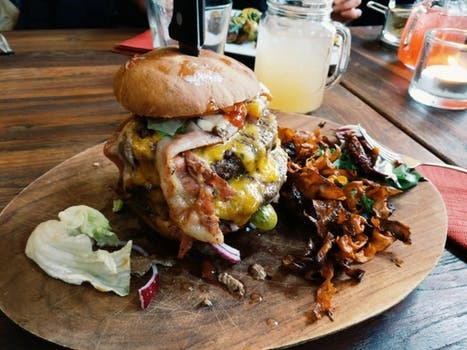
That is some serious I.Q.
And this is the movie:
 See? Sad.
See? Sad.
In the words of Francis Bacon: "Some books should be tasted, some devoured, but only a few should be chewed and digested thoroughly."
"The Count of Monte Cristo" is one of the few.

Let's compare the book and the movie.
Book:

That is some serious I.Q.
And this is the movie:
 See? Sad.
See? Sad.In the words of Francis Bacon: "Some books should be tasted, some devoured, but only a few should be chewed and digested thoroughly."
"The Count of Monte Cristo" is one of the few.
Published on February 02, 2018 23:46



